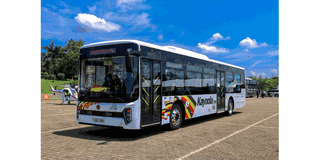Shift to electric cars, Museveni tells Ugandans

A hybrid Kiira EV is seen in Kampala recently. President Museveni (inset) says the world should shift from using fuel vehicles. PHOTO/FILE
What you need to know:
- The Ugandan leader since 1986- warned that subsidies on essentials would trigger an atmosphere identifiable with scenes that ended over 15-years of the Rajapaksa dynasty in bankrupt Sri-Lanka.
- Mr Museveni, 77, viewed that endless pandemic outbreaks and current global warming in parts of Europe are a price the universe is paying for “artificial problems caused by man’s attempt to challenge God’s might.”
President Museveni has urged Ugandans to shift to electric cars as the country joins global powers to contain a looming recession amid climate change concerns world over.
“This is the answer. The correct way is to start moving away from petrol to electric cars and we have already started,” Mr Museveni said.
A hybrid 5-seater Ugandan made Kiira Electric Vehicle (EV) costs over Shs100million in a country whose GDP per capita just hit $1,046 at the start of FY2022/23, government data shows.
But Mr Museveni said one of the designers of the Kiira EVs, Paul Musasizi, told him that –for instance- an electric bus uses Shs360 per km which is almost five times cheaper than a similar fossil fuel bus (using Shs1, 600 per km).
“Electric vehicles are cheaper, cleaner, have no pollution and apparently have less maintenance cost,” he observed.
Appearing to fall back on his earlier slam at the COP26 declaration by world leaders to have zero new vehicle emission by 2040 in leading markets, Mr Museveni said: “This is the solution we should go for.”
Less than 2 per cent of Uganda’s more than 44 million people own a car with fuel prices approaching Shs7, 000 ($1.8) in a beleaguered economy.
“This fuel is likely going to remain high. Even when our petrol is here, we will have to sell it at the world price minus the transport costs,” Mr Museveni disclosed.

One of more than five Ugandan made Kayoola EV fully electric low floor buses is seen during an exhibition at Kololo Independence Grounds recently. PHOTO/COURTESY
The president noted that Uganda needs Shs20billion to develop more affordable electric automotives while crisis after crisis has also awakened government to breathe new life in Uganda’s long-dead railway networks.
“Once people get tired of expensive diesel, they will shift to the train. Fortunately, the railway system for Pakwach-Gulu-Tororo is there and they are repairing it,” he said.
Mr Museveni added: “We are now repairing the old railway metre gauge from Tororo to Kampala. The only problem maybe Kasese because the railway line was vandalized and we shall have to build a totally new one there.”
‘Paying the price’
Mr Museveni, 77, viewed that endless pandemic outbreaks and current global warming marked by wildfires and temperatures soaring over 40 degrees Celsius in parts of Europe are a price the universe is paying for “artificial problems caused by man’s attempt to challenge God’s might.”

Flames are seen inside a house burnt down by a wildfire in Megara, west of Athens, on July 20, 2022. PHOTO/AFP
Unprecedented climate change has already taken toll on Uganda with food production projected to double-slump in the remainder of 2022.
“The biggest problem now is that we can no longer have plenty in this kind of situation,” Mr Museveni warned.
‘Not like Sri Lanka’
Additionally, the Ugandan leader since 1986- warned that subsidies on essentials would trigger an atmosphere identifiable with scenes that ended over 15-yearss of the Rajapaksa dynasty in bankrupt Sri-Lanka.
“When you subsidize, you create an artificial comfort for people to think that things are normal and they don’t leave frugally,” he said.
“You bleed yourself when you encroach on your foreign reserves which are now more than Shs4billion,” Mr Museveni emphasized in a July 20 night address many perceive to have offered no solutions to Uganda's raging economic crisis.





